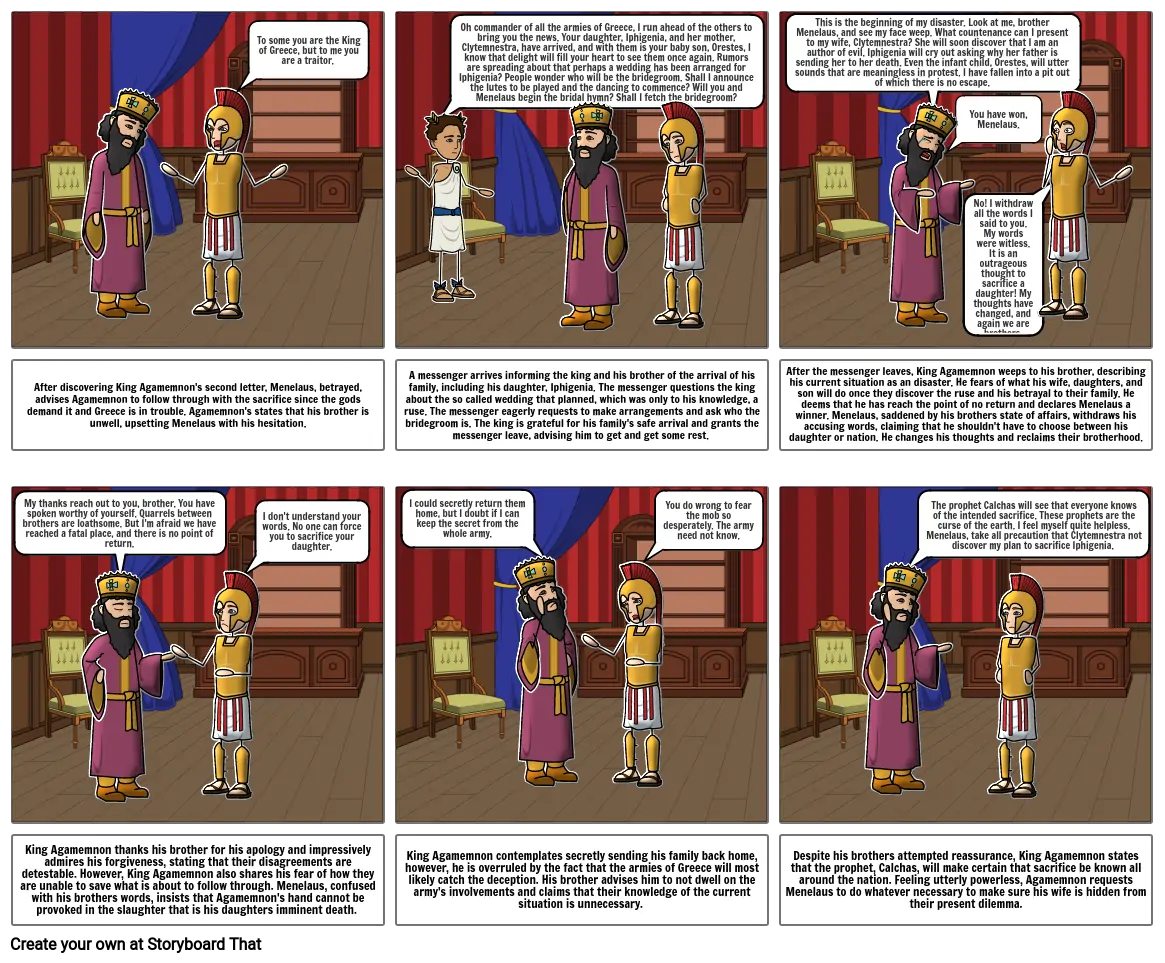Iphigenia in Aulis Storyboard Assignment - Hirushi Gunawardana

Storyboard Text
- To some you are the King of Greece, but to me you are a traitor.
- Oh commander of all the armies of Greece, I run ahead of the others to bring you the news. Your daughter, Iphigenia, and her mother, Clytemnestra, have arrived, and with them is your baby son, Orestes, I know that delight will fill your heart to see them once again. Rumors are spreading about that perhaps a wedding has been arranged for Iphigenia? People wonder who will be the bridegroom. Shall I announce the lutes to be played and the dancing to commence? Will you and Menelaus begin the bridal hymn? Shall I fetch the bridegroom?
- This is the beginning of my disaster. Look at me, brother Menelaus, and see my face weep. What countenance can I present to my wife, Clytemnestra? She will soon discover that I am an author of evil. Iphigenia will cry out asking why her father is sending her to her death. Even the infant child, Orestes, will utter sounds that are meaningless in protest. I have fallen into a pit out of which there is no escape.
- You have won, Menelaus.
- No! I withdraw all the words I said to you. My words were witless. It is an outrageous thought to sacrifice a daughter! My thoughts have changed, and again we are brothers.
- After discovering King Agamemnon's second letter, Menelaus, betrayed, advises Agamemnon to follow through with the sacrifice since the gods demand it and Greece is in trouble. Agamemnon's states that his brother is unwell, upsetting Menelaus with his hesitation.
- My thanks reach out to you, brother. You have spoken worthy of yourself. Quarrels between brothers are loathsome. But I'm afraid we have reached a fatal place, and there is no point of return.
- I don't understand your words. No one can force you to sacrifice your daughter.
- A messenger arrives informing the king and his brother of the arrival of his family, including his daughter, Iphigenia. The messenger questions the king about the so called wedding that planned, which was only to his knowledge, a ruse. The messenger eagerly requests to make arrangements and ask who the bridegroom is. The king is grateful for his family's safe arrival and grants the messenger leave, advising him to get and get some rest.
- I could secretly return them home, but I doubt if I can keep the secret from the whole army.
- You do wrong to fear the mob so desperately. The army need not know.
- After the messenger leaves, King Agamemnon weeps to his brother, describing his current situation as an disaster. He fears of what his wife, daughters, and son will do once they discover the ruse and his betrayal to their family. He deems that he has reach the point of no return and declares Menelaus a winner. Menelaus, saddened by his brothers state of affairs, withdraws his accusing words, claiming that he shouldn't have to choose between his daughter or nation. He changes his thoughts and reclaims their brotherhood.
- The prophet Calchas will see that everyone knows of the intended sacrifice. These prophets are the curse of the earth. I feel myself quite helpless. Menelaus, take all precaution that Clytemnestra not discover my plan to sacrifice Iphigenia.
- King Agamemnon thanks his brother for his apology and impressively admires his forgiveness, stating that their disagreements are detestable. However, King Agamemnon also shares his fear of how they are unable to save what is about to follow through. Menelaus, confused with his brothers words, insists that Agamemnon's hand cannot be provoked in the slaughter that is his daughters imminent death.
- King Agamemnon contemplates secretly sending his family back home, however, he is overruled by the fact that the armies of Greece will most likely catch the deception. His brother advises him to not dwell on the army's involvements and claims that their knowledge of the current situation is unnecessary.
- Despite his brothers attempted reassurance, King Agamemnon states that the prophet, Calchas, will make certain that sacrifice be known all around the nation. Feeling utterly powerless, Agamemnon requests Menelaus to do whatever necessary to make sure his wife is hidden from their present dilemma.
Over 30 Million Storyboards Created

